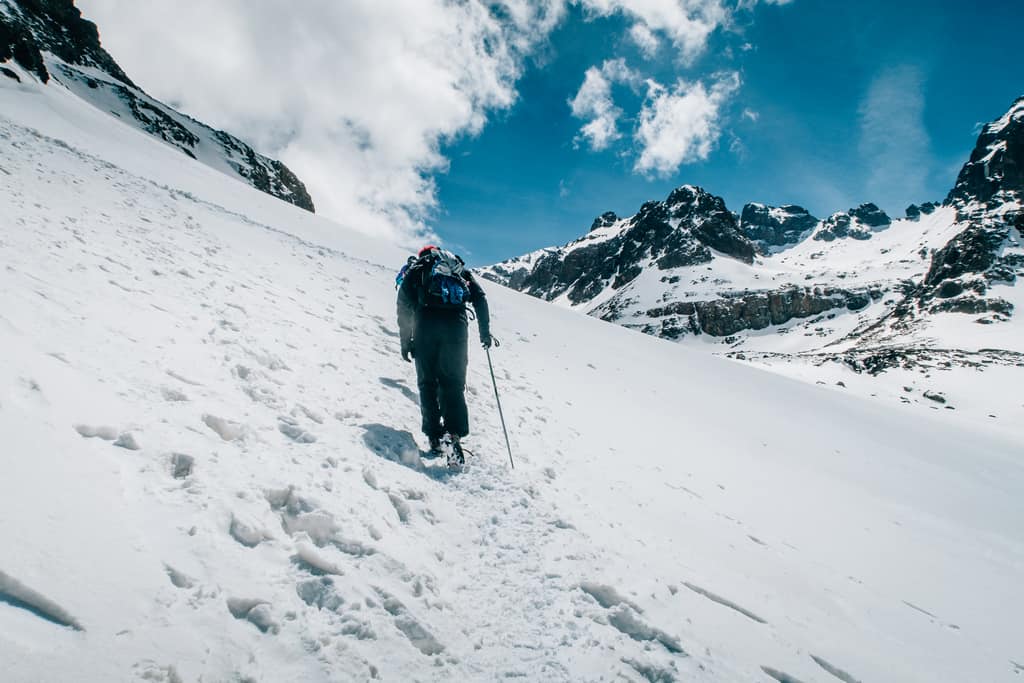Mount Toubkal Hiking Guide :
Hiking Mount Toubkal, the highest peak in Morocco and North Africa, is a thrilling adventure that attracts outdoor enthusiasts from around the globe. Standing tall at 4,167 meters (13,671 feet), Toubkal offers a breathtaking trekking experience with spectacular views of the Atlas Mountains and, on clear days, the vast Sahara Desert. Whether you’re an experienced hiker or someone with moderate fitness, climbing Mount Toubkal is within reach for most adventurers.
This comprehensive guide will provide all the essential details on how to prepare for the hike, including the best time to visit, how to get there, what to pack, and what to expect during the trek.

Where is Mount Toubkal?
Located in the heart of Morocco’s Atlas Mountains, Mount Toubkal is easily accessible from the vibrant city of Marrakesh. The mountain lies around 65 kilometers (40 miles) south of Marrakesh, and the closest village, Imlil, serves as the main starting point for trekkers heading to the summit. The journey from Marrakesh to Imlil takes about 1.5 to 2 hours by car
Imlil is a charming Berber village where you can find guesthouses, restaurants, and local guides to help you with the climb. It also offers a great opportunity to immerse yourself in local culture before embarking on the hike.
How to Get to Mount Toubkal from Marrakesh
There are several transportation options to get to Imlil from Marrakesh:
- Shared Taxi (Grand Taxi): The most popular and affordable option, these taxis depart from Marrakesh’s Jemaa el-Fnaa bus station. Shared taxis are available for a lower price if you wait for the vehicle to fill upJournal of Nomads.
- Private Taxi: If you prefer more comfort or a direct ride, you can hire a private taxi for around 250-300 MAD (Moroccan dirhams)Journal of Nomads.
- Public Transport: Buses also run from Marrakesh to Asni, from where you can catch a shared taxi to ImlilFlash Pack.
The Best Time to Hike Mount Toubkal
While Mount Toubkal can be hiked year-round, the best months to attempt the climb are from April to October. During these months, the weather is milder, and the mountain trails are more accessible. Winters (November to March) bring snow, which can make the trek more challenging and require more advanced preparation and gear
Trekking Routes and What to Expect
The journey to Mount Toubkal typically involves two stages:
- Day 1: Imlil to Base Camp
After reaching Imlil, the first day of your trek involves a challenging but rewarding ascent to the Toubkal Base Camp. The hike from Imlil takes approximately 6 hours, gaining about 1,500 meters in elevationFlash PackJournal of Nomads. The path winds through beautiful valleys, past Berber villages, and along rocky trails. Along the way, you’ll witness panoramic views of the surrounding Atlas Mountains. - Day 2: Summit Day
The second day is the ascent to the summit. The climb from Base Camp to the peak takes about 3-4 hours, depending on the weather and your fitness level. Once at the top, you will be rewarded with unparalleled views of the entire region, including the vast desert landscape on a clear dayFlash Pack.The descent back to Base Camp and then to Imlil typically takes around 6-7 hours total, with the return trip being easier due to the downhill slopeFlash Pack.
Accommodations and Facilities in Imlil
Imlil offers a variety of accommodations, ranging from budget-friendly guesthouses to more luxurious options. Some of the most popular spots include Dar Amadine for budget travelers and Riad Atlas 4 Seasons for those seeking more comfort
. Many of these accommodations offer dinner and breakfast, which are essential for preparing for the demanding trek ahead.
What to Pack for Mount Toubkal Hiking
When preparing for your Mount Toubkal trek, packing the right gear is crucial. Here’s a checklist of what to bring:
- Proper Footwear: Sturdy hiking boots are essential to navigate the rocky and uneven terrain.
- Warm Clothing: Even in the summer months, the summit can be cold, so pack layers including a warm jacket, gloves, and a hat.
- Water and Snacks: Carry sufficient water to stay hydrated, as well as high-energy snacks like nuts and granola bars.
- Sunscreen and Hat: The sun at higher altitudes can be intense, so don’t forget to protect yourself.
- First Aid Kit: Carry basic medical supplies, including bandages, painkillers, and any personal medications.
- Headlamp or Flashlight: Useful if you plan to start early or descend after sunsetFlash PackJournal of Nomads.
Hiring a Guide for the Mount Toubkal Trek
While the hike to the summit is non-technical, hiring a local guide can enhance your experience. A guide will not only help you navigate the trail but also provide insights into the local culture, flora, and fauna. Additionally, guides can ensure your safety and assist in case of emergencies
Guides can be hired in Imlil, and many trekking agencies in Marrakesh also offer guided tours.
Other Things to Do Around Mount Toubkal
While hiking Mount Toubkal is the main attraction, there are other activities in the region that can enrich your experience:
- Trekking in the Atlas Mountains: Explore the numerous trails that lead through stunning valleys and traditional Berber villages.
- Visit the Imlil Waterfalls: A short hike from Imlil, these waterfalls are a refreshing stop after a long trekJournal of Nomads.
- Experience Berber Culture: Learn about the traditional lifestyles of the Berber people who inhabit the region.
For more travel tips and to book your next Moroccan adventure, visit MoroccoNext.
Conclusion
Mount Toubkal offers a challenging yet accessible adventure for all hiking enthusiasts. With proper preparation, the right gear, and a little determination, reaching the summit will reward you with unforgettable views and a sense of accomplishment. Whether you’re a seasoned trekker or a first-time hiker, the Mount Toubkal hike is an experience that should not be missed.
For detailed trekking tips, guides, and booking options, visit MoroccoNext for more information.


Comment (0)